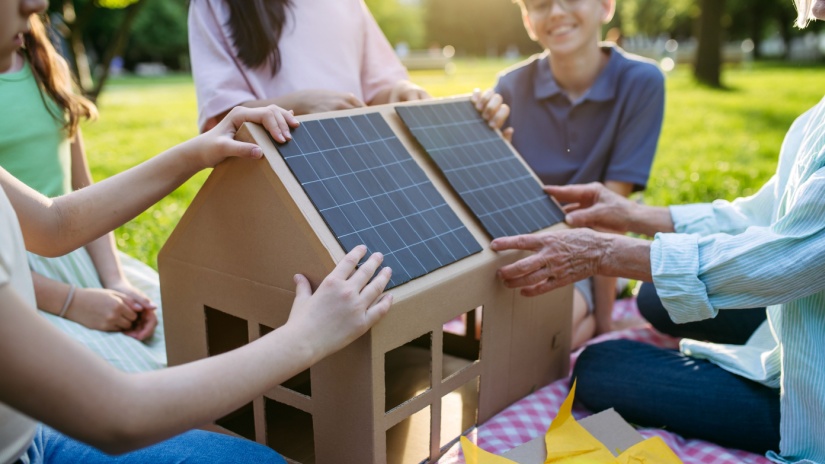Knowledge Centre
How do solar panels work?

As Australia continues its transition towards renewable energy, solar power has emerged as a leading solution for both residential and commercial energy needs. With abundant sunshine and increasing energy costs, more Australians are turning to solar panels to power their homes and businesses.
But how exactly do solar panels work, and what should you consider before making the switch?
Let’s dive deep into how solar panels generate electricity, explore the advantages and limitations, and examine how switching from traditional energy sources to solar can offer significant benefits.
How solar panels work
Solar panels work by converting sunlight into electricity through a process known as the photovoltaic effect. Here's how it works step-by-step:
- Sunlight hits the solar panels, which are typically mounted on rooftops or open areas facing the sun.
- The panels contain photovoltaic (PV) cells, usually made from silicon, which absorb sunlight.
- When sunlight photons strike the PV cells, they excite electrons in the silicon atoms, creating a flow of electricity.
- This electricity is direct current (DC), which then flows to a solar inverter.
- The inverter converts DC electricity into alternating current (AC), which is compatible with the Australian electricity grid and your home’s appliances.
- The power can be used immediately, stored in solar batteries, or fed back into the grid for a feed-in tariff.
- Australia’s climate - with its high solar irradiation levels - makes this process highly efficient and cost-effective for many households and businesses.
Pros and cons of installing solar panels
| Pros | Cons |
| Reduced electricity bills. Lower or eliminate your energy costs by generating your own power. | Upfront cost. Initial installation and equipment costs can be high. |
| Government incentives. Eligible for STCs (Small-scale Technology Certificates) and rebates. | Weather dependent. Performance drops on cloudy or rainy days. |
| Environmentally friendly. Reduces carbon footprint and reliance on fossil fuels. | Energy storage cost. Batteries can be expensive if you want to store excess energy. |
| Increased property value. Homes with solar often sell for more. | Installation limitations. Not all roofs are suitable for solar panels (e.g., shaded or angled incorrectly). |
| Low maintenance. Solar systems require minimal maintenance after installation. | Feed-in tariffs are declining. Lower compensation for excess electricity fed to the grid. |
| Energy independence. Reduces reliance on power companies. | Lifespan limits. Solar panels degrade over time, typically lasting 25–30 years. |
Benefits of going solar
Australia is one of the sunniest countries on Earth, making solar energy a natural choice. Here are some compelling benefits of switching to solar:
Lower energy bills
With electricity prices rising across the country, solar panels can offer significant savings over time. Many Australian households report saving hundreds, if not thousands, of dollars annually.
Environmental impact
Solar energy is clean, renewable, and drastically reduces greenhouse gas emissions. By switching to solar, the average Australian household can prevent up to 4 tonnes of CO₂ emissions per year.
Energy independence
Solar systems provide a sense of control. When combined with battery storage, households can become largely self-sufficient - particularly useful during blackouts or energy crises.
Government rebates and incentives
The Australian Government and state programs offer incentives to make solar more affordable. The Small-scale Renewable Energy Scheme (SRES) provides a financial benefit for eligible systems via STCs.
Long-term investment
A well-installed system can pay for itself in 5–7 years, with decades of potential free energy thereafter. As power prices increase, your savings grow even more.
In-depth examples of solar panel use
Residential homes
Homeowners in suburbs across Sydney, Melbourne, Brisbane, and Perth are installing rooftop solar to offset daily energy use. Pairing solar with smart home technology allows automatic management of high-usage appliances, like air conditioning and pool pumps, during peak sunlight hours.
Rural and remote properties
Farms and remote areas use solar panels to power water pumps, electric fences, and entire off-grid systems. In regions where connection to the main grid is expensive or unavailable, solar is often the most practical solution.
Commercial buildings
Shopping centres, warehouses, and offices are investing in large-scale solar installations. For example, in South Australia, several supermarkets now operate on hybrid solar-battery systems to reduce operational costs and carbon emissions.
Electric vehicles (EVs)
Solar power is increasingly used to charge EVs. With solar charging stations at home or businesses, you can effectively fuel your vehicle for free.
Swapping from gas and electric plans to solar
Switching from traditional gas and electricity plans to solar-powered plans offers long-term economic and environmental benefits:
- Cost reduction: Solar plans can dramatically reduce your dependency on the grid, reducing your bills and exposure to fluctuating energy prices.
- Stable pricing: Unlike gas and electricity, the sun doesn’t charge peak hour rates. With solar, you benefit from predictable, low-cost energy.
- Cleaner energy mix: Traditional gas and coal-fired power plants contribute heavily to greenhouse gas emissions. Solar energy helps you reduce your personal and household carbon footprint.
- Battery storage integration: Many solar plans now include options for battery storage, ensuring that even when the sun isn’t shining, your home still runs efficiently.
Modern solar energy plans are tailored to suit various needs - from fully off-grid living to grid-connected hybrid models. Many providers now offer solar feed-in tariffs, where you get paid for excess electricity sent back into the grid - creating an opportunity to earn credit on your bills.
Ready to go solar?
Making the switch to solar energy is more accessible and beneficial than ever for Australian households and businesses. Whether you’re looking to cut your energy bills, reduce your environmental impact, or increase the value of your property, solar power offers a compelling path forward.
Contact Compare Energy on 1300 790 106 today to discuss your solar options and find the best solar energy plan tailored to your needs. Our team can help you compare providers, understand incentives, and maximise your savings with clean, reliable solar power.

